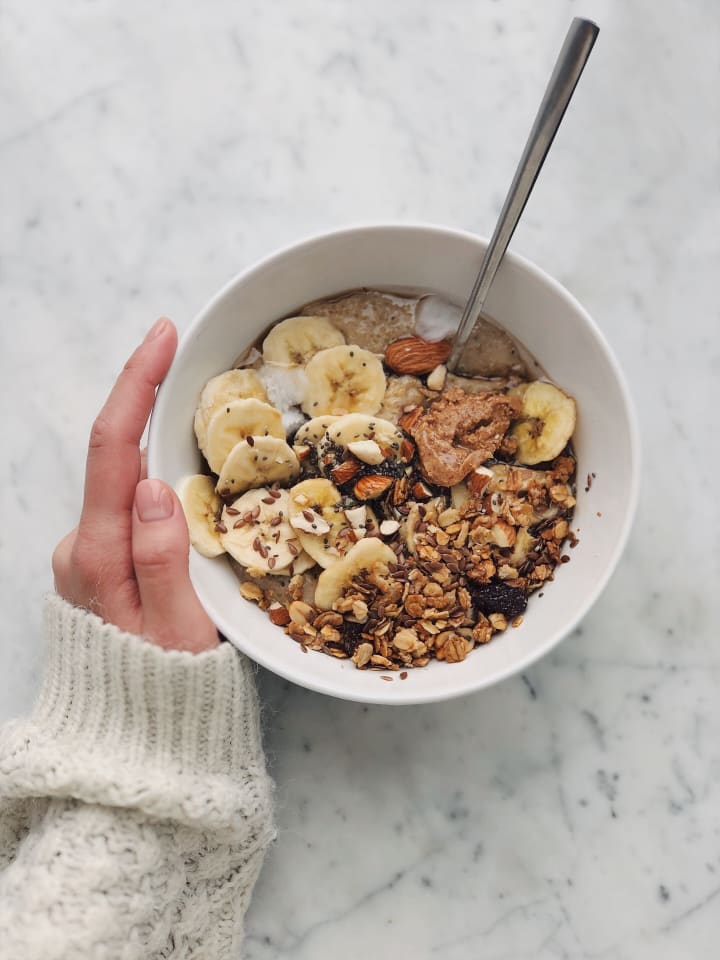Foodie Resolutions for the New Year
Eat and glow into the New Year!

The holidays are rapidly approaching as the year comes to a close.
As families gather around their menorahs and fresh-cut Christmas trees, many others are declaring holiday memories and New Year resolutions! Resolutions are great to channel and focus on positive physical and mental energy. As yoga aides to relax the mind and spirit, food resolutions are essential and beneficial to health.
Why not have healthy eating goals too?
In today's food industry, organic and gluten-free foods have become popular. Whether you're a carnivore, omnivore, or herbivore, add these tasty nutrient staples to your New Year's resolutions list! Each food pantry staple adds loads of vitamins and minerals for your eyes, hair, skin, nails, memory, and more!
1. Energy: Iron & CoQ10

Iron is needed for movement of oxygen around the body.
Iron is an essential mineral that is part of hemoglobin, which helps maintain your strength and energy. A shortage in iron can lead to iron-deficiency anemia.
Fortified cereals, baked potatoes, and cashews are high in iron. Gluten-free foods like quinoa, lentils, and red meats carry the essential mineral.
CoQ10 plays a huge role in energy production.
Also known as Coenzyme 10 aids and generate energy in cells. CoQ10 protects cells from damage and disease-causing bacteria and viruses. It also helps treat heart failure by improving heart function. Health conditions, like heart disease, brain disorders, diabetes, and cancers have been linked to low CoQ10 levels.
Veggies like cauliflower and fruits like strawberries and oranges have potent levels of CoQ10. The essential mineral can be found in sesame seeds, cold-water fish, chicken, and pistachios.
2. Immune System: Vitamin A & E
Vitamin A consists of essential organic compounds like retinal and several pro-vitamin A carotenoids. Vitamin A plays a huge role in the growth and baby development, immune system, and satisfactory vision.
According to Heathline, vitamin A is found in two forms: preformed or pro-vitamin.
Preformed vitamin A is found in meat, poultry, fish and dairy products. Pro-vitamin vitamin A is found in plants.
Both aspects of vitamin A are needed in your daily regimen.
Consuming adequate amounts of vitamins can reduce the risk of certain types of cancers, reduce the risk of acne, and support bone health.
Enjoy foods like carrots, sweet potatoes, and collard greens. They're rich in vitamin A! Fruits like apricot and cantaloupe have moderate levels of vitamin A.
Vitamin E has a group of eight soluble compounds including tocopherols and tocotrienols. Vitamin E is important to the health of your blood, brain, and skin. The antioxidants of vitamin E aid in delaying the progress of Alzheimer's disease, liver disease, prostate cancer, and preeclampsia.
Vitamin E aids eye health, brain function, and gene expression. Vitamin E is needed for a regular immune system.
Pantry food staples like canola and olive oil, margarine, almonds, and peanuts are packed with Vitamin E. You can also find vitamin E in leafy greens and fortified cereals.
A diet low in vitamin E can cause or lead to nerve problems.
3. Intestines/Bowels: Vitamin D and Vitamin B3

Functional bowel is a topic many do not want to discuss but is essential to your daily regimen. Vitamin D reduces the risk of colon cancer and prevents osteoporosis, depression, anxiety, and fibromyalgia.
Vitamin D helps regulate the absorption of calcium and normal immune system function. Sufficient amounts of vitamin D are essential for normal growth and development of teeth and bones, weight loss, and reducing the risks of certain cancers, and developing the flu.
Taste Vitamin D from natural sunlight and foods like salmon, sardines, or shrimp. You can also find vitamin D in fortified dairy products and orange juice.
4. Memory and Joints: Omega-3 Fatty Acids
Busy days can not rely on schedules, smartphones, and accountability partners. As entrepreneurs open business each day, it's important to feed your memory with omega-3 and fatty acids to keep you going.
ALA, also known as alpha-linolenic acid is found in plants such as nuts and seeds. These essential fatty acids are needed to reduce stiffness and joint pain.
According to Heathline, omega-3 fatty acids contain many beneficial properties. The essential fatty acids aid to reduce depression and anxiety, improve eye health, reduce blood clots, improve memory, and reduce symptoms of ADHD in adolescents.
Studies have shown omega-3 fatty acids can reduce the risk of autoimmune diseases like diabetes, lupus, and psoriasis.
Foods like soybeans, salmon, walnuts, chia seeds, and flaxseeds.
Feed your memory blueberries, dark chocolate, broccoli, or whole grains. I love exploring Stella Bistro Foods Turmeric Sultry Spice because it's great with my eggs in the morning, which is also great as brain food. Avocado is great for brain food and omega-3 fatty acids.
Taste and begin your new year with flavorful foods and loads of benefits!
About the Creator
Ashley Terrell
Bestselling author. Entrepreneur. Seasonings and spices saved my life. Where sheep and angels share the same color. Newport News, VA. Conqueror and lover of all things Fine Arts.






Comments
There are no comments for this story
Be the first to respond and start the conversation.